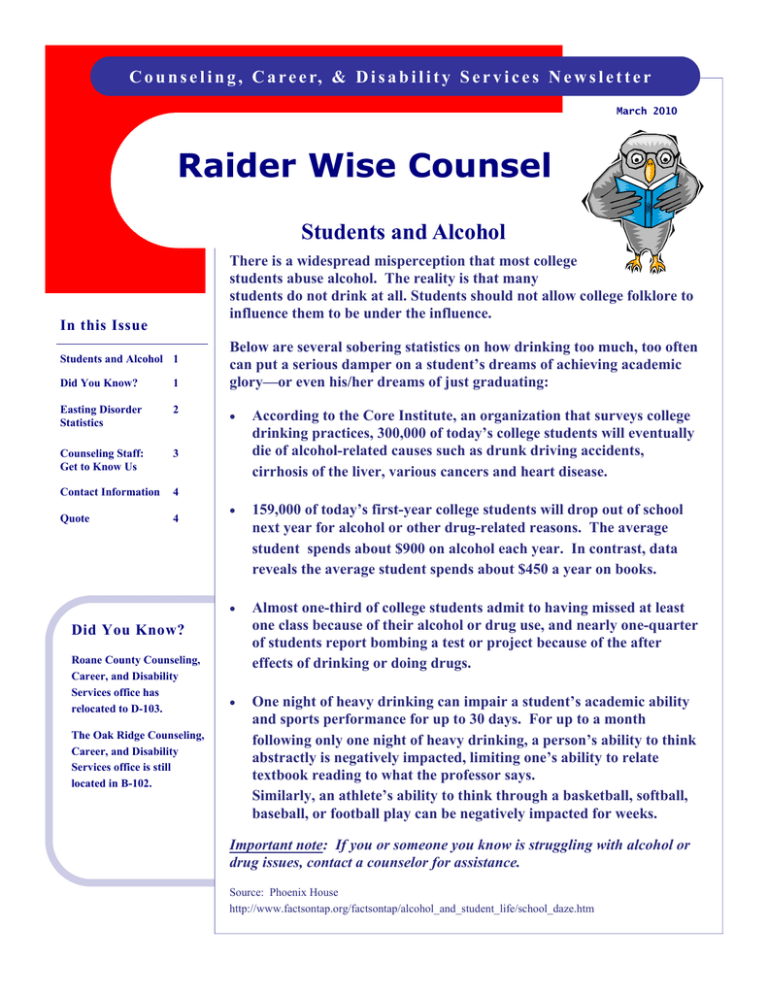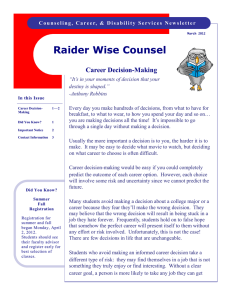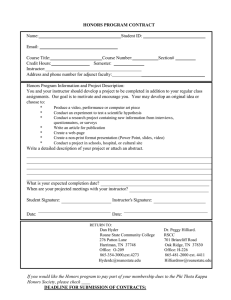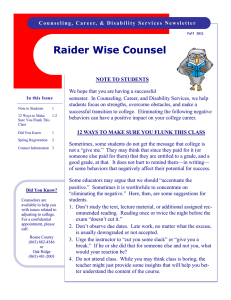Document 12066650
advertisement

C o u n s e l i n g , C a r e e r, & D i s a b i l i t y S e r v i c e s N e w s l e t t e r March 2010 Raider Wise Counsel Students and Alcohol There is a widespread misperception that most college students abuse alcohol. The reality is that many students do not drink at all. Students should not allow college folklore to influence them to be under the influence. In this Issue Students and Alcohol 1 Did You Know? 1 Easting Disorder Statistics 2 Counseling Staff: Get to Know Us 3 Contact Information 4 Quote 4 Below are several sobering statistics on how drinking too much, too often can put a serious damper on a student’s dreams of achieving academic glory—or even his/her dreams of just graduating: • According to the Core Institute, an organization that surveys college drinking practices, 300,000 of today’s college students will eventually die of alcohol-related causes such as drunk driving accidents, cirrhosis of the liver, various cancers and heart disease. • 159,000 of today’s first-year college students will drop out of school next year for alcohol or other drug-related reasons. The average student spends about $900 on alcohol each year. In contrast, data reveals the average student spends about $450 a year on books. • Almost one-third of college students admit to having missed at least one class because of their alcohol or drug use, and nearly one-quarter of students report bombing a test or project because of the after effects of drinking or doing drugs. • One night of heavy drinking can impair a student’s academic ability and sports performance for up to 30 days. For up to a month following only one night of heavy drinking, a person’s ability to think abstractly is negatively impacted, limiting one’s ability to relate textbook reading to what the professor says. Similarly, an athlete’s ability to think through a basketball, softball, baseball, or football play can be negatively impacted for weeks. Did You Know? Roane County Counseling, Career, and Disability Services office has relocated to D-103. The Oak Ridge Counseling, Career, and Disability Services office is still located in B-102. Important note: If you or someone you know is struggling with alcohol or drug issues, contact a counselor for assistance. Source: Phoenix House http://www.factsontap.org/factsontap/alcohol_and_student_life/school_daze.htm Page 2 Eating Disorder Statistics Over one person’s lifetime, at least 50,000 individuals will die as a direct result of their eating disorder. Without treatment up to twenty percent (20%) of people with serious eating disorders die. With treatment, that number falls to two to three percent (2-3%). Eating Disorders affect a large number of people in the United States. The statistics state that: • Approximately 7 million girls and women struggle with eating disorders. • Approximately 1 million boys and men struggle with eating disorders. Important Note: If you or someone you know is dealing with issues possibly related to an eating disorder, please contact a Counselor for confidential assistance and resource information. Amount of people affected by specific eating disorders: • 0.5% - 3.7% of females suffer from Anorexia Nervosa in their lifetime. • 1.1% - 4.2% of females suffer from Bulimia Nervosa in their lifetime. • 2% - 5% of the American population experience Binge Eating Disorder. • 10% - 25% of all those battling anorexia will die as a direct result of the eating disorder. • Up to 19% of college-aged women in America are bulimic. • Age at onset of an eating disorder: 10% report onset at 10 years or younger; 33% report onset between ages of 11-15; 43% report onset between ages of 16-20; 86% report onset of illness by the age of 20. College • As many as 10% of college women suffer from a clinical or nearly clinical eating disorder, including 5.1% who suffer from bulimia nervosa. • Studies indicate that by their first year of college, 4.5 to 18% of women and 0.4% of men have a history of bulimia and that as many as 1% of females between the ages of 12 and 18 have anorexia. With treatment, about sixty percent (60%) of people with eating disorders recover. In spite of treatment, about twenty percent (20%) of people with eating disorders make only partial recoveries. The remaining twenty percent (20%) do not improve, even with treatment. Source: The National Institute of Mental Health, National Association of Anorexia Nervosa and Associated Disorders Page 3 Counseling Staff: Get to Know Us Introducing: Tina Messamore In the last issue, we introduced you to our Director, Tracey Watson, and our two Counselors, Jeff Snell and Julianne Cole. In this issue, we would like to introduce you to our Support Staff. Support Staff Carol Jarabek Support Staff Tina Messamore has been with Roane State for 24 years. She was the first person in her family to attend college. She began attending Roane State in the fall of 1982 after graduation from high school. She received an Associate of Science degree in Business Management Technology in 1984. While attending Roane State, she worked as a work-study student in the Personnel, Payroll, and Foundation Offices. Before graduating from RSCC, she began working as a secretary with the Foundation on a part-time basis. Tina worked with the Foundation until the fall of 1988 and then due to organizational restructuring, she began working in Counseling. She has worked as a secretary in Counseling for 22 years and is currently the secretary on the Oak Ridge campus. She is married and has two nieces and two nephews. She loves animals and enjoys assisting in projects that benefit animals. She has four dogs—Curly, Copper, Sugar, and Duke. She enjoys old movies, cooking, walking, and most of all spending time with her family. Carol Jarabek has been with Roane State since 1994. She began as a 50% secretary in the Athletic Department. In 1996 Carol also began working not only 50% in the mornings in the Athletic Department but 50% in the Human Resources Department in the afternoons. After a few years, she was hired full time in one area—for the Dean of Student Services under the supervision of Beverly Bonner. With organizational changes, Carol’s job changed again in January 2009 when she became the secretary for both Beverly Bonner, Assistant VP for Student Services and the Roane County secretary for Tracey Watson, Director of Counseling, Career, and Disability Services. Carol has an AS degree in Office Administration and is a CPS. She and her husband have been married for 31 years and have 2 daughters, Becky who lives in Texas with her husband, and Jennifer who lives in Knoxville. Page 4 RAIDER WISE COUNSEL Counseling, Career, & Disability Services Staff: Tracey Watson Director Jeff Snell Counselor Julianne Cole Counselor Tina Messamore Support Staff Carol Jarabek Support Staff Roane State Community College Counseling, Career, and Disability Services Contact Information Roane County Tracey Watson, Director watsontl@roanestate.edu 865-882-4546 Carol Jarabek, Support Staff jarabeklc@roanestate.edu 865-882-4546 Oak Ridge Jeff Snell, Counselor snellja@roanestate.edu 865-481-2003 Julianne Cole, Counselor davisjy@roanestate.edu 865-481-2003 Tina Messamore, Support Staff messamore@roanestate.edu 865-481-2003 www.roanestate.edu/counseling www.roanestate.edu/disabilityservices www.roanestate.edu/careerservices Quote The curious paradox is that when I accept myself just as I am, then I can change. —Carl Rogers RSCC is a TBR and AA/EEO institution. RSCC publication # 10-075.




